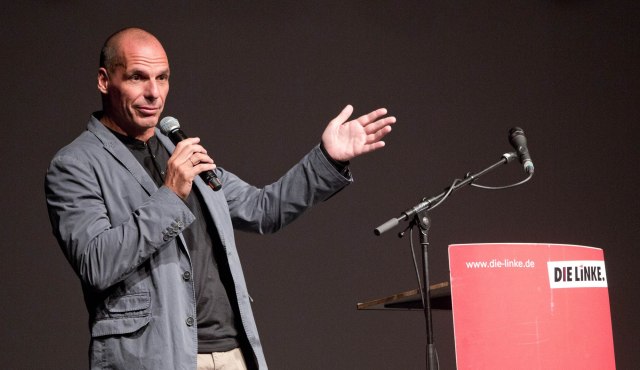Former Greek Finance Minister Yanis Varoufakis speaking to the German Left; Credit: Jörg Carstensen/DPA/PA Images

One of the reasons for the resurgence of the radical left in Europe is its ability to appeal to Eurosceptics and Europhiles at the same time. The British Labour leader, Jeremy Corbyn, has proved especially adept at pulling off this gravity-defying balancing act.
An influential advisor on this matter is Yanis Varoufakis – the former Greek finance minister and a sworn enemy of the EU establishment. In a fascinating piece for the New Statesman (“as told to George Eaton”), Varoufakis reveals the nature of radical left thinking on the European Union.
Quite a lot of it is compatible with the thinking of the eurosceptic right:
“As democrats, we must accept the result of the referendum. To seek to overturn it through a second vote would be to do to the British people what the EU did to the Irish over the Lisbon Treaty: keep repeating the question until they delivered ‘the right answer’. The UK electorate would rightly conclude that referendums only count when they deliver the result that the establishment wants.
“The promise of a second referendum, as my Brexiteer friends (such as the former Conservative chancellor Norman Lamont) have noted, would also give the EU a strong incentive not to yield on any front. After this, Britain would be left to go cap in hand to the EU, begging to be readmitted, without any of the concessions that Margaret Thatcher and others secured.”
That said, Varoufakis would rather Britons had voted to stay:
“From the beginning of my conversations on Brexit with the Labour leadership, I advocated a ‘radical Remain’ stance: the UK should be for the EU, but not this EU. The labour movement in Britain and elsewhere has been critical of the operations of the state at the national level without calling for its disbandment. Similarly, we can be critical of the EU without seeking to leave it.”
Sadly, there’s little similarity between the “state at the national level” and the EU. While one can be critical of both, only one – the nation-state – is open to change. Consider Britain’s post-war history, during which there’s been at least four radical changes in direction (1945, 1979, 1997 and 2016). Compare that to the history of the EU (and its predecessor bodies); since the formation of the European Coal and Steel Community in 1951, there’s been evolution and expansion, but each development has served to make the European ‘project’ more like itself.
The EU is a neoliberal and transnational construct. That was true when Jeremy Corbyn was still making his mind up about things (i.e. many decades ago) – and on this issue he’s had no reason to change his thinking. It’s no wonder that Labour supports an interim agreement between Britain and the EU; delaying a final Brexit settlement (or the absence thereof) also delays the final showdown between the Europhile and Eurosceptic left.
Varoufakis is clear about where he stands:
“Labour has left open the option of permanent membership of the single market if the EU grants the UK new controls over free movement. But this won’t happen. Nor should it. Borders should be an enemy of all progressives: either we are internationalists, or we are not. Those of us who have been critical of neoliberal globalisation have always pointed out that we have the free movement of goods, commodities and capital – but not of people.”
A socialist surely ought to know the distinction between people on the one hand and “goods, commodities and capital” on the other. Indeed, treating these categories as essentially interchangeable is a defining feature of neoliberalism.
Varoufakis also talks of borders as if they were obstacles to progress, when the opposite is true. There can be no progress without change and no change without difference. Borders, and the nations they define, enable difference. One can disagree with Corbyn’s idea of progress (and I do), but in terms of achieving any kind of change at all, he is right and Varoufakis is wrong.
The European Union is a system for embedding the status quo. Which is why the establishment is so keen on it.










Join the discussion
Join like minded readers that support our journalism by becoming a paid subscriber
To join the discussion in the comments, become a paid subscriber.
Join like minded readers that support our journalism, read unlimited articles and enjoy other subscriber-only benefits.
Subscribe